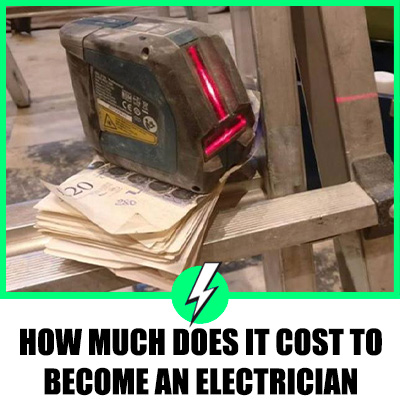How Much Does A Licensed Electrician Make?
Electricians are minting the most Sterling Pounds when it comes to tradespeople in all of Great Britain. And this is not an isolated case in the last fiscal year. For four consecutive years, the incomes of electricians are steadily increasing. You may want to check out the 2020 UK trades salary survey results and see for yourself.
The average electrician salary in the UK was an impressive £33,495 in 2020.

However, this is the median salary. According to the ONS or Office of National Statistics, the median value of the electrician’s pay represents the best data. This means that some electricians earn a lot more and less than the figure in the survey.
So how much money does a licensed electrician make? Let’s find out the answer in this post.
First, let us discuss what type of jobs a licensed electrician does.
Most licensed electricians work as self-employed. Therefore, their responsibilities as electricians cover a wide range. Licensed electricians can do more than your average domestic electrician. And they are a little less than an industrial electrician. However, they are pretty much free to pick up any electrical job that they want.
Contents
Licensed electrician type of jobs
- Installation of light fixtures, appliances, and power systems
- Rewiring and repairing in homes as well as commercial areas
- Checking and maintaining electrical systems, including security systems and central heating systems
- Monitoring and supervising other electricians on his team
With the probable job responsibilities out of the way, here is a look at how much you can make as a licensed electrician.
The approximate figure of how much a licensed electrician can make per job.
Note:
- The figures below include the national minimum wage and the cost of materials unless mentioned otherwise. However, it does not include the VAT.
- This is an approximation, and you should not treat it as absolute. Besides, factors including the time taken to complete the job and your location will significantly influence the final cheque amount.
Light fixtures and fittings – Indoors and outdoors
- Replacing light fixtures supplied by the customer – £40 to £50
- Installing a single downlighter in the living room with no new wiring – £80 to £100
- Supplying and fitting new lights in the loft with external switch – £75 to £150
- Replacing switches, including dimmers – £35 to £65
- Supplying and installing security light outdoors – £85 to £140
- Replacing or upgrading a consumer unit – £300 to £450
- Upgrading old fluorescent light to LED downlight – £250 to £400
Appliances - Replacing an existing extractor fan with no new wires – £125 to £225
Installing a new extractor fan and connecting it to the mains with new - wiring – £250 and £475
- Replacing an existing standard ceiling fan with no new wires – £50 to £75
- Supplying and installing a ceiling fan with new wires – £150
- Installing a new ceiling luxury fan – £400 to £500
- Supply and fit a smoke alarm to the mains – £80 to £130. This figure is for the first smoke alarm. So for subsequent smoke alarms, you can expect £40 to 90 for every new addition.
- Supplying, fitting, and connection of an electric shower – £350 to £500
- Fitting an electric cooker with no new wiring – £35 to £65
- Install and fit a double outdoor socket – £110 to £165
- Repairing a power cable of appliances – £35 to £55
- Supply, replace, and fit a fuse box – £450 to £550
Rewiring
The type of British houses and the size will determine the overall cost of rewiring. However, a general quote to rewire a house may look like this.
Remove old wires, light fixtures, and install new wires and fixtures.
- Rewiring a one-bedroom apartment – £1,900 to £3,000. And the estimated time to complete the rewiring is anywhere from four to seven days.
- Rewiring a two-bedroom apartment – £2,300 to £3,500 with the work duration between five to eight days.
- Complete removal of old wires and fixtures and rewiring a 3-bedroom semi-detached house – £3,000 to £4,500 taking anywhere from six to 10 days to complete the job.
- Complete rewiring of up to 10 rooms along with a certificate – £3,700 to £5,500. Also, the approximate time to complete rewiring is about 15 days, give or take.
Central heating systems
Most of the older British homes have oil or gas boilers. So the first person on the call is usually a plumber. However, electricity powers the thermostats, pumps, and controls, among others. So a licensed electrician may be called for the job.
- Supplying and fitting a room thermostat – £75 to £105
- Fitting a new cylinder thermostat – £95 to £125
- Supplying and fitting a control clock – £90 to £150
- Diagnosing the problems of the central heating system – £40 to 100. This is usually for the first hour. But diagnosing problems with a central heating system can take longer, which can kick up the final wage.
- Earth bonding
- Earth bonding is not a typical electrical work that requires the attention of electricians. However, in rooms that have a bath or a shower, earth bonding is a legal requirement.
- Earth bonding to gas and water pipes – £150 to £250
Inspection and electrical safety certificate
All licensed electricians are not qualified to carry out electrical safety inspections. But those who are qualified to conduct checks will also need to issue an electrical safety certificate.
Electrical inspections are also not common as they are carried out once in 10 years. Nevertheless, you can expect the following figure while carrying out electrical inspections and issue a safety certificate.
- 1-bedroom apartment – £100 to £150
- 2-bedroom apartment – £120 to £170
- 3-bedroom apartment – £180 to £230
- Five bedrooms or a larger home – £300 and more additional work which licensed electricians can make good money.
As a licensed electrician, the earning potential is totally up to you. You can decide whether to take up the available job or not. In fact, the flexibility to choose your work is one of the best things about working as a licensed electrician.
Nevertheless, here are some additional electrical projects that you can pick up to make extra income.
- General circuit testing after rewiring and installation of appliances and light fixtures – £80 to £300
- Installing air conditioner – £1,000 to £6,000
- Supply and fit access control indoors – £500 to £800 per door
- PAT or Portable Appliance Testing – £1 to £2 per appliance or £40 to £45 per hour. Up to 50 appliances can be tested in one undertaking. However, if an appliance needs repairs, it comes at an additional cost.
- Installing an electric boiler – £1,700
- Repairing a heated towel rack – £75 per rail
- Supplying and fitting a new heated towel rack – £235 per rail
- Supply and install the underfloor heating system – £50 to £80 per sq metre. So it can run up to £300 for a day’s work.
- Installation of electric vehicle charging points – £200 to £300 per charging point
Solar panels vs. solar tiles
With more Brits becoming conscious of their energy consumption, many homeowners and commercial properties prefer to install solar panels. In addition, solar tile installation is also on the rise.
The pay you can expect from this type of electrical works may look like this:
- Installation of 3kw solar panels – £4,000 to £6,000
- Installing 3kw solar roof tiles – £10,000 to £12,000
Emergency electrician earning potential
Similar to the nature of other tradespeople, licensed electricians are often called to handle emergencies. Since electrical emergencies can happen during the day or night, most licensed electricians charge between 2.5 to 3 times more than the standard hourly rate. This is called the emergency call-out fee.
Factors that determine the final payment for an electrical job
Location
One of the critical components that affect the paycheque of licensed electricians seems to be the location. London is the highest paying city with average electricians cashing up to £37,529 on average for any electrical job. It is not uncommon for licensed electricians to charge up to £45 an hour or £350 a day. Therefore, for any electrical works, a licensed electrician in London, and the South charges 15% to 20% more than those in low paying areas.
The British East Midlands, on the other hand, is where electricians earn the lowest on the national average. The average annual earnings for electricians in the area is about £29,789, which is a stark difference.
The duration of the job
The job’s duration is another factor that plays a significant role in how much you make as a licensed electrician. Charging a job per hour is standard for most electricians. However, the electrical work’s complexity and the wiring condition can also affect how long you need to spend on the job.
Also, if you need to remove and dispose of all appliances or hide the wires, it can extend the work duration. It would be best to quote your price by charging per day, driving up the final payment in such cases.





